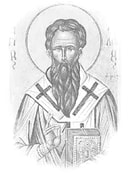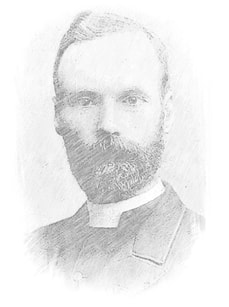John 1
 Michael J Kruger
Michael J Kruger
John is the most theological gospel. Just to be clear, all the gospels are theological in their own right. But scholars have noted that John’s Gospel is distinctive in regard to the more direct, and more developed ways, that he affirms a number of important theological truths. At the top of the list, of course, is the divinity of Jesus. John wastes no time on this point because the very first verse says: “In the beginning was the Word, and the Word was with God, and the Word was God.” --Michael J. Kruger; Cannon Fodder; 7 Reasons Why the Gospel of John is So Special 8.15.22
 St Basil
St Basil
"John has admirably confined the conception within circumscribed boundaries by two words, ‘In the beginning was the Word.’ For thought cannot travel outside ‘was,’ nor imagination beyond ‘beginning‘. Let your thought travel ever so far backward you cannot get beyond the ‘was,’ and however you may strain and strive to see what is beyond the Son, you will find it impossible to get further than the ‘beginning.’ True religion, therefore, thus teaches us to think of the Son together with the Father.” -St. Basil the Great; On The Spirit
 James Hastings
James Hastings
A word is the true expression of him who utters it. We have various ways of communicating with one another, but the chief apparatus, which we call the body, sits a tenant who is wholly distinct from the body. This tenant thinks, wills, feels--lives a life separate from the sense--a life sacred and invisible. How shall this tenant communicate with the out world? By speech: alphabets and words come to his help; the lip is taught their use, and then the sacred tenant within the body can utter itself to the world. So, St John conceives Go as cut off from man by many barriers; "no man hath seen God at any time, nor can he see him." How shall God communicate with the creature He has made? He does so by His Word. Christ is the very mind of God translating itself into symbols which man can comprehend. As your word is yourself uttered, so Christ is God uttered. "In the beginning was the Word, and the Word was with God, and the Word was God."
-James Hastings; The Greatest Texts of the Bible John I-XII; 1912
-James Hastings; The Greatest Texts of the Bible John I-XII; 1912
|
John 1:4-5:
"In Him was life, and the life was the light of men. And the light shines in the darkness, and the darkness did not comprehend it." |
"Darkness" refers to the realm of spiritual evil, the state of the world under Satan's sway since the Fall. It is because men are sinful and live in a world of darkness, that they are not guided by the light of reason and conscience. The darkness, however, could not extinguish the light. A single penetrating shaft of light is more powerful than the utter blackness of rejection. Over and over again, this Gospel makes that clear. A simple act, stooping to wash the feet of the confused, worried disciples or a quiet word to a guilt-ridden adulterous woman, "Neither do I condemn you; go and sin no more" (John 8:11), is mightier than the anger and violence of His enemies.
|
|
John 1:14:
And the Word was made flesh, and dwelt among us, (and we beheld his glory, the glory as of the only begotten of the father), full of grace and truth". |
To say that the word became flesh does not imply that he ceased to be God. Rather he added the condition of humanity to what he already was.
Grace is power. That whereby God works in nature is called power. That power whereby He works in the wills of His reasonable creatures is called grace. Grace is not simply kindly feeling on the part of God, but a positive boon conferred on man. Grace is a real and active force: it is the “power that worketh within in us,” illuminating the intellect, warming the heart, strengthening the will of the redeemed humanity. It is the might of the everlasting Spirit, renovating man by uniting him to the sacred manhood of the “Word Incarnate.” Grace is a revelation of the will of God now. |
Before the meaning of the Incarnation can satisfactorily be dealt with, the fact of the God-man must be positively established. Unless there had been a recognized, and historically proved God-man, unique in his person and different from all other ordinary men, there would have been no incarnation of deity in human flesh.
That such a person did appear upon the earth is claimed by all the New Testament writers; and the testimony of his history concedes the claim. That this unique person had experienced an eternity of existence with the Father, and had shared in the creation of the universe, is declared by the Apostle John in John 1:1,3. That he was the redeemer of the world is also professed for him, throughout the New testament. (see John 1:10-13).
Both deity and humanity are predicated of him. He was very God, and very man. He was both deity and humanity; as perfect in his deity; but so human that he could die. He ws the son of God, and a son of man.
Philip Schaff, one of the greatest scholars of the past generation, in his splendid volume entitled "The Person of Christ," recounting the above facts, points out that another striking thing concerni9ng this unique person--that of sinlessness. He ably argues, that the sinlessness of Jesus Christ is, in itself, a stronger argument for his deity, than were the miracles of which Christ performed. Jesus, himself, pointed to his miracles as answer to ther question of his identity, when he told the disciples of John the Baptist: "Go and shew John again those things which ye do and hear and see: The blind receive their sight, and the lame walk, the lepers are cleansed, and the deaf hear, the dead are raised up, and the poor have the gospel preached to them." (Matt 11:4-5).
Sinc e Christ miracles were considered as credentials of his deity, by Christ himself, they must not be checked off as evidences. Miracles appear so easy to Christ, as if they dropped from his sinlessness constituted even greater evidence. Therre were others who performed miracles, but there was none others of whom sinlessness could be truthfully predicated. He only could stand before his enemies and challengingly ask, "Which of you convicts me of sin?" (John 8:46). When submitted to this supreme acid test, he was sinless, putting him into a class entirely alone.
That such a person did appear upon the earth is claimed by all the New Testament writers; and the testimony of his history concedes the claim. That this unique person had experienced an eternity of existence with the Father, and had shared in the creation of the universe, is declared by the Apostle John in John 1:1,3. That he was the redeemer of the world is also professed for him, throughout the New testament. (see John 1:10-13).
Both deity and humanity are predicated of him. He was very God, and very man. He was both deity and humanity; as perfect in his deity; but so human that he could die. He ws the son of God, and a son of man.
Philip Schaff, one of the greatest scholars of the past generation, in his splendid volume entitled "The Person of Christ," recounting the above facts, points out that another striking thing concerni9ng this unique person--that of sinlessness. He ably argues, that the sinlessness of Jesus Christ is, in itself, a stronger argument for his deity, than were the miracles of which Christ performed. Jesus, himself, pointed to his miracles as answer to ther question of his identity, when he told the disciples of John the Baptist: "Go and shew John again those things which ye do and hear and see: The blind receive their sight, and the lame walk, the lepers are cleansed, and the deaf hear, the dead are raised up, and the poor have the gospel preached to them." (Matt 11:4-5).
Sinc e Christ miracles were considered as credentials of his deity, by Christ himself, they must not be checked off as evidences. Miracles appear so easy to Christ, as if they dropped from his sinlessness constituted even greater evidence. Therre were others who performed miracles, but there was none others of whom sinlessness could be truthfully predicated. He only could stand before his enemies and challengingly ask, "Which of you convicts me of sin?" (John 8:46). When submitted to this supreme acid test, he was sinless, putting him into a class entirely alone.
Light cannot be anything other than what it is. It is bright; it gets rid of darkness, enabling people to see what they are doing in the light. God is light, and since He sent the Holy Spirit to live inside Believers, so are we. As Jesus' ambassadors, we shine even when we do not know it.
Jesus said to "let our light shine before others," calling them to live in faith. Put our light on its stand and use our circumstances as an opportunity to shine brightly for Jesus and to share God's truth with those around us. Our family and community can tell what we believe by how we live.
Light is the key to life, and everything grows by it and depends on light. We rely on light to see and our body's systems to function normally.
Jesus said to "let our light shine before others," calling them to live in faith. Put our light on its stand and use our circumstances as an opportunity to shine brightly for Jesus and to share God's truth with those around us. Our family and community can tell what we believe by how we live.
Light is the key to life, and everything grows by it and depends on light. We rely on light to see and our body's systems to function normally.
|
John 1:16-18:
And of his fulness have all we received, and grace for grace. 17 For the law was given by Moses, but grace and truth came by Jesus Christ. 18 No man hath seen God at any time, the only begotten Son, which is in the bosom of the Father, he hath declared him. |
God is light, He is holy, He is pure, He is without sin and cannot be around any darkness or sin. Only when a person is cleansed of sin and is walking as Jesus walked can God be with him and he walks in the light.
|
 Denny Burk
Denny Burk
John 1:16-18, “16 For of His fullness we have all received, and grace in place of grace. 17 For the Law was given through Moses; grace and truth were realized through Jesus Christ. 18 No man has seen God at any time; the only begotten God, who is in the bosom of the Father, He has explained Him.”
What do it mean that no man has seen God at any time? Moses spoke with God mouth to mouth, face to face. Well, sort of. Moses knew that he wasn’t seeing the full blazing glory of God and asked God to let him see it in Exodus 33. But God said, No man can see my full glory and live. Not even you, Moses. So I’m gonna let my glory pass you by, but I will hide you in the cleft of the rock so that you don’t get incinerated by my unmediated glory.
Sure, Moses saw more than anyone ever had, but not even Moses saw full glory. But now we have Jesus. The only begotten God, who not only sees the unmitigated glory. He is the unmitigated glory of God! Moses is not the mountaintop. Jesus is the mountaintop of God’s revelation. You may have seen Moses, but you haven’t seen anything yet if you haven’t seen Jesus. Jesus alone is the only-begotten God in the bosom of the Father who explains the Father. Only Jesus can say, as he does in John 14, “If you have seen me, you have seen the Father.” --Denny Burk; Saving the Best for Last — John 2:1-11 8.15.23
What do it mean that no man has seen God at any time? Moses spoke with God mouth to mouth, face to face. Well, sort of. Moses knew that he wasn’t seeing the full blazing glory of God and asked God to let him see it in Exodus 33. But God said, No man can see my full glory and live. Not even you, Moses. So I’m gonna let my glory pass you by, but I will hide you in the cleft of the rock so that you don’t get incinerated by my unmediated glory.
Sure, Moses saw more than anyone ever had, but not even Moses saw full glory. But now we have Jesus. The only begotten God, who not only sees the unmitigated glory. He is the unmitigated glory of God! Moses is not the mountaintop. Jesus is the mountaintop of God’s revelation. You may have seen Moses, but you haven’t seen anything yet if you haven’t seen Jesus. Jesus alone is the only-begotten God in the bosom of the Father who explains the Father. Only Jesus can say, as he does in John 14, “If you have seen me, you have seen the Father.” --Denny Burk; Saving the Best for Last — John 2:1-11 8.15.23
|
John 1:17:
"For the law was given by Moses, but grace and truth came by Jesus Christ." |
The law defined sin, but the law could not save. Salvation was supplied by the grace of God. Law and grace cant be separated. Dan Delzell, in the Christian post, wrote: "Notice that the contrast is not between grace and truth. It is between the Law of the Old Testament and the Gospel of the New Testament. Grace and truth came to us secured tightly together in Jesus Christ and never to be separated. This is a critically important fact for a Christian to grasp.
|
Martin Luther:
We need to learn how to clearly distinguish the law given through Moses from the grace that came through Christ. We must always keep the role of Christ separate from the role of Moses and make a clear distinction between the two
We need to know precisely what purpose each one fulfills so that we don’t become confused. I was confused about this distinction myself for over thirty years. I just couldn’t believe that Christ wanted to show His kindness to me.
The first commandment teaches us that God wants us to sincerely trust him. Yet we also must fear him above everything else. In other words, Christians are like children who have been punished but who still love their father.
And they remain confident that their father still loves them. The good works required by the first commandment are far better than wearing special clothes, fasting, praying, and all other the other god works religious people have invented.
So the good works required by the first commandment are holy and must be obeyed. But who can live up to them? Certainly no one can completely obey the first commandment. Everyone is a sinner except Christ.
Christ, however, comes to us and says, “I have shed my blood for you. My blood cries out on your behalf.” Out of his grace and kindness, he brings us the forgiveness of our sins at no cost to us whatsoever.
We need to learn how to clearly distinguish the law given through Moses from the grace that came through Christ. We must always keep the role of Christ separate from the role of Moses and make a clear distinction between the two
We need to know precisely what purpose each one fulfills so that we don’t become confused. I was confused about this distinction myself for over thirty years. I just couldn’t believe that Christ wanted to show His kindness to me.
The first commandment teaches us that God wants us to sincerely trust him. Yet we also must fear him above everything else. In other words, Christians are like children who have been punished but who still love their father.
And they remain confident that their father still loves them. The good works required by the first commandment are far better than wearing special clothes, fasting, praying, and all other the other god works religious people have invented.
So the good works required by the first commandment are holy and must be obeyed. But who can live up to them? Certainly no one can completely obey the first commandment. Everyone is a sinner except Christ.
Christ, however, comes to us and says, “I have shed my blood for you. My blood cries out on your behalf.” Out of his grace and kindness, he brings us the forgiveness of our sins at no cost to us whatsoever.
|
John 1:18:
No one has ever seen God, but God the One and Only,who is at the Father's side, has made him known. |
This revelation is complete. Before the New Testament or any of its books and letters even existed, what writings the world had were only like a half image. Holy men in vain tried to read its meaning til the fullness of Christ came. (I Peter:11-15). But, now, that unto us a Child is born the completeness of the Bible is assured (Is 9:6). A golden corn of scarlet thread runs through us all. (Josh 2:18). The one to be lifted up, a sacrifice for sin, is first and last, the central figure. In Him is all that is good. The lawyer for the law, the artists for the painting, the poet for the poem, take Jesus and His word. All roads led to Rome. Every text centers to Christ. All biographies and history will end in Jesus Christ.
|
|
John 1:45:
Philip found Nathanael and said to him, "We have found him of whom Moses in the Law and also the prophets wrote, Jesus of Nazareth, the son of Joseph. |
"May very many exclaim, as the translator has often done when studying numerous passages in the original, I have found the Messiah!" -Helen Spurrell
|









